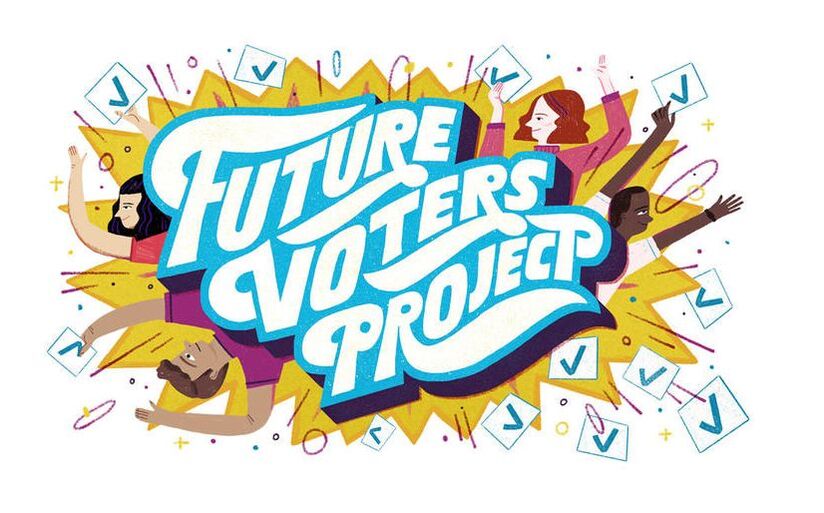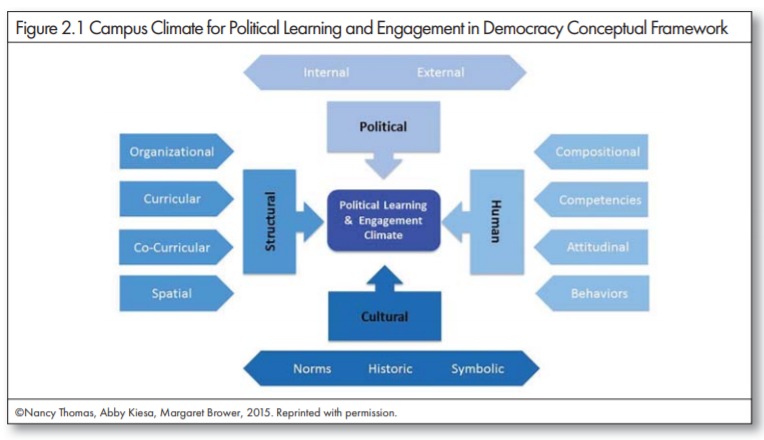Voting & Civic Engagement
 https://www.tolerance.org/future-voters-project https://www.tolerance.org/future-voters-project
Voting Awareness Elections, Debate and Cognitive Bias. Facing History and Ourselves, 2020. Foundations of Democracy and Government. ShareMyLesson.com. We are continually updating these resources to help facilitate meaningful discussions with students and communities … to put a focus on how crucial the foundations of democracy are to the preservation of a functional government. The Future Voters Project from Teaching Tolerance aims to register all eligible students to vote and provides news-responsive classroom activities about voting. The organization will send you a viewers guide and a DVD of the popular documentary Selma: The Bridge to the Ballot. Did I mention it was free? “How Media Habits Relate to Voter Participation.” Knight Foundation, 8 Sep 2020. “In February 2020, the John S. and James L. Knight Foundation released the 100 Million Project, a landmark study that surveyed 12,000 chronic non-voters nationally and in ten swing states in order to explore the underlying challenges of electoral participation. Americans who don’t vote in elections—approaching 100 million and comprising roughly 43% of eligible voters as of the last presidential election in 2016—differ from active voters along a wide range of attitudes and behaviors related to voting, elections and politics.” Jenkins, Tommy. Drawing the Vote: An Illustrated Guide to Voting in America. Abrams, 2020. “How the history of American voting rights has shaped the way we vote today.” BOOKS Sidhu, Ranjit. “Resources for Talking to Students About Politics, Civic Engagement, and Uncertainty.” ASCD, 8 Jan 2021. WhenWeAllVote.com/schools Sign up and join the fight to get all eligible students to vote! The site includes action plans and tools to facilitate conversations, while former first lady Michelle Obama and musical legend Common inspire and empower our students to vote. Free printable flyers and information are available. AMANDA GORMAN: "The Hill We Climb"
PBS. Lesson Plan: Discuss 22-year-old Amanda Gorman’s Inaugural Poem “The Hill We Climb”. Jan 2021. In this lesson, students examine the poetry of Amanda Gorman, who was chosen to read her poem “The Hill We Climb” at President Joe Biden’s inauguration on Jan. 20, 2021. Gorman’s poem complemented Biden’s inaugural address and was written to reflect on “the history that we stand on, and the future that we stand for.” CIVIC ENGAGEMENT |
A Vote, A Voice. National Museum of American History. This is part of “American Democracy: A Great Leap of Faith.” “When it was established, the United States of America boasted more eligible voters than ever before. But it was still just a fraction of the new country’s population. The nation’s founders never envisioned the numbers, classes, sexes, and races of Americans that cast ballots each Election Day. They envisioned a world in which propertied men rose above self-interest and voted on behalf of the rest of “the people.” Many of “the people,” however, showed a stubborn desire to vote directly to choose their leaders and laws. The result has been reluctant adjustments, contentious struggles, and ongoing negotiations as groups tried to persuade lawmakers, the courts, and their fellow citizens to let them share the power of the polls.”
Jenkins, Tommy. Drawing the Vote: An Illustrated Guide to Voting in America. Abrams, 2020. This links to the Abrams promotional info, including a video introduction to the drawings and content. The book illustrates “How the history of American voting rights has shaped the way we vote today.” VOTING “Why She Votes.” Washington Post, 21 Aug 2020. “The 19th Amendment was only the beginning of the fight to secure voting rights for all American women. As we honor the suffragists of the early 20th century and the civil rights activists of the 1950s and ’60s, we also remember the women who taught future generations to exercise their most fundamental democratic right. These are the stories of women inspired by those who voted first.” 12 important women of different backgrounds , races and ages. Short videos. Civil Discourse
Teaching Tolerance. "Civil Discourse in the Classroom." TeachingTolerance.org. "This [4 chapter] curriculum will introduce basic tools for teaching civil discourse. It is not subject-specific; on the contrary, these tools of argumentation and discussion lend themselves to any subject in any classroom." Available online, and in downloadable PDF. Engaging Differences. National Institute for Civil Discourse. "It is up to Us to Bridge, not Deepen, our Divides." This includes videos focused on "Engaging Differences," and working together "During Hardship," which features everyday Americans, faith leaders, and legislators from North Carolina and Washington states. National Coalition for Dialog & Deliberation. Engagement Streams Framework (Web version; printable version) Incudes “Engagement Streams,” or purposes as well as “Process distinctions,” aka methods to address the purpose. Very clearly laid out. Fostering Civil Discourse, A Guide for Classroom Conversations. Facing History and Ourselves. “Facing History and Ourselves uses lessons of history to challenge teachers and their students to stand up to bigotry and hate.” “People make choices. Choices make history.” Lenci, Kent. “Connecting Students Across the Partisan Divide” HuffPost, 29 June 2017. A Massachusetts teacher about building connections between his students and a Birmingham AL class to look at political opinions. He refers to these important supporting tools. --Living Room Conversations - A Topic List “Living Room Conversations are a conversational bridge across issues that divide and separate us. They provide an easy structure for engaging in friendly yet meaningful conversation with those with whom we may not agree.” --All Sides: Unbiased, Balanced News - exactly what it says. --MisMatch: Connecting people across distance and divides to engage in respectful, face-to-face conversations. “A matching, scheduling, and real time video conferencing platform purpose-built for civil discourse between U.S. classrooms.” Thomas & Bower. Book Chapter: “The Politically Engaged Classroom.” From Teaching Civic Engagement Across the Disciplines (2017). (from Institute for Democracy and Higher Education at Tufts University) Includes this diagram of four aspects of the political climate of a classroom. |
